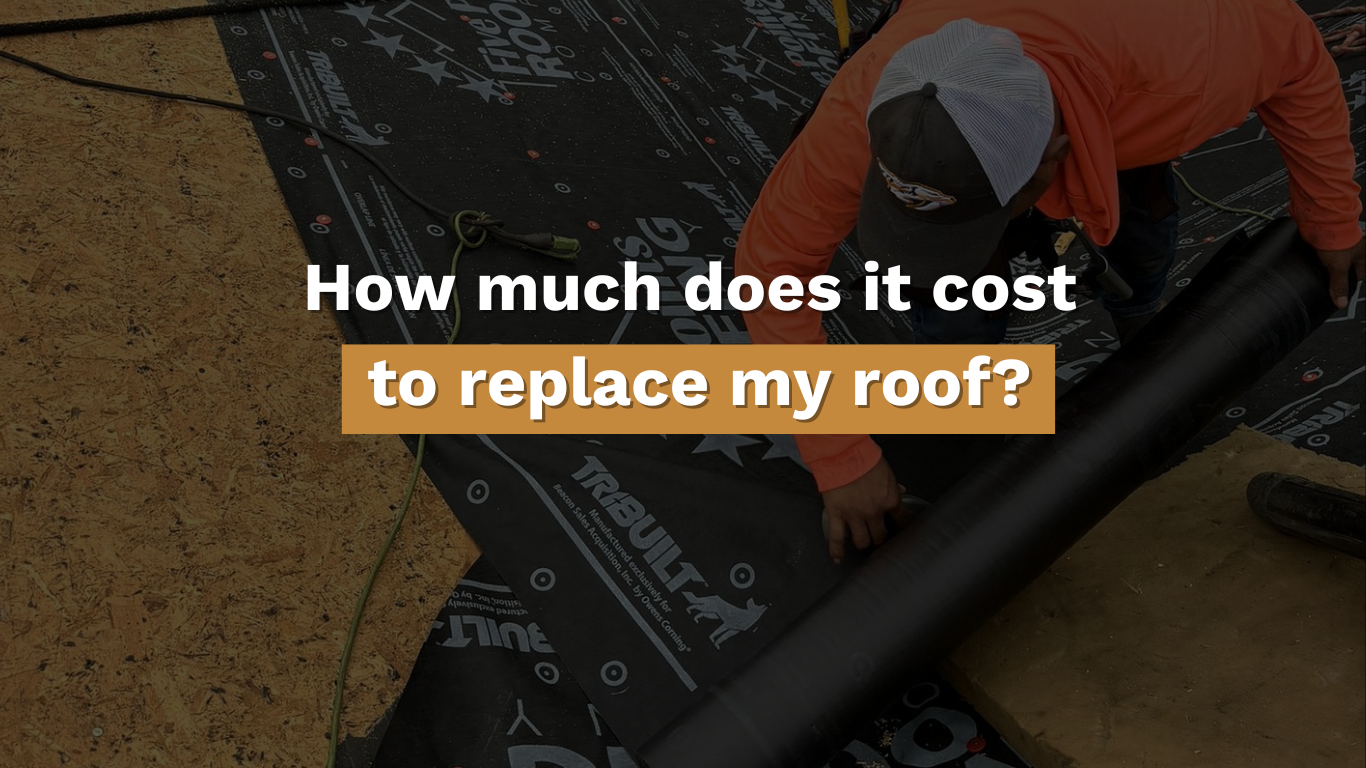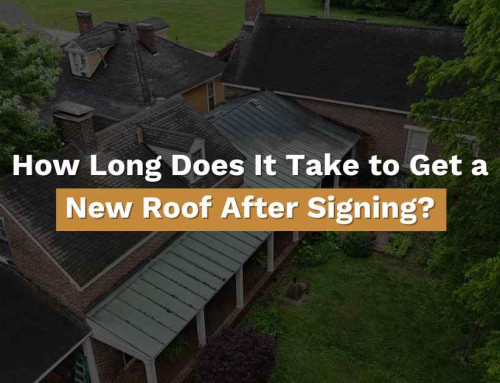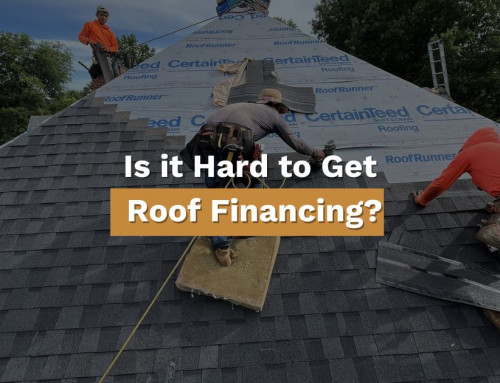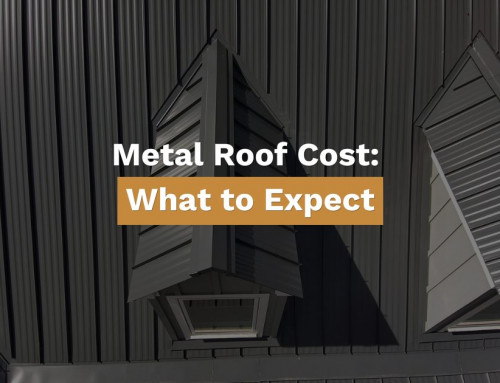
What you will find in this article: Roof replacement costs depend on factors like size, material, and labor. Asphalt shingles are the cheapest, while metal, slate, and wood cost more. On average, a 2,000 sq. ft. roof costs between $7,000 and $40,000. For an accurate estimate, schedule a professional inspection.
Replacing a roof is one of the most essential home improvement projects homeowners face. A new roof protects your home from the elements, enhances its curb appeal, and increases its overall value. One of the first questions we hear at Five Points Roofing Company is: How much does it cost to replace a roof?
Metal roofs are a valuable investment due to their longevity, energy efficiency, and low maintenance. They can last up to 70 years and are particularly suitable for cold climates where snow and ice accumulation is a concern.
While it’s hard to pinpoint an exact price without knowing the specifics of your home, the average roof replacement cost for a standard-sized home is approximately $11,500. Several factors impact the overall cost of a roof replacement. Below, we’ll break down the most essential elements determining a new roof’s cost.
Size of the Roof per Square Foot
The size of your roof is one of the most significant factors in determining the cost. Roofing companies typically price their jobs by the square, with one square equaling 100 square feet. The larger the roof, the more materials and labor are required, which increases the overall cost. Additionally, replacing the entire roof can significantly impact the total expense compared to partial replacements.
Type of Roofing Material
The material you choose for your roof impacts the price. Here are some common materials and their price ranges:
| Types of Roof | Cost Per SQ Foot | Pro |
|---|---|---|
| Asphalt Shingles | $4.25 and $5.50 per square foot | Asphalt Shingles are the most common and affordable roofing material. |
| Metal Roofing | $10 and $16 per square foot | Metal roofing is more durable and energy-efficient |
| Slate or Tile | $20 and $30 per square foot | These premium materials offer high durability and an upscale appearance |
| Wood Shingles | $25 to $35 per square foot | Wood shakes or shingles provide a rustic, natural look. |
The best material for your roof depends on your budget, the style of your home, and how long you plan to stay there.
Labor and Installation Costs
Roof installation is a significant component of roof replacement costs. It typically accounts for 40% to 60% of the total price. For a simple asphalt shingle roof, labor might cost between $1.50 and $3.00 per square foot. However, the labor cost can increase if your roof has steep slopes or complex architectural features.
Roof Pitch and Complexity
The pitch (or steepness) of your roof also affects the cost. Steeper roofs are more challenging to work on, requiring additional safety precautions and more labor, which increases the price. Complex roofs with multiple valleys, dormers, or skylights will also be more expensive to replace than a simple, flat roof. These factors significantly influence the overall replacement cost, as they can lead to higher material and labor expenses, as well as potential unforeseen costs during the project.
Number of Stories and Roof Accessibility
The number of stories and roof accessibility can significantly impact the cost of roof replacement. A single-story home with easy roof access will typically be less expensive to replace than a multi-story home with complex roof access. The height of the home affects the overall roofing replacement cost, as it requires more labor and equipment to access the roof.
For instance, a single-story home with a simple roof design can cost between $4,000 to $8,000 to replace. In contrast, a two-story home with a moderate roof design might range from $6,000 to $12,000. If you have a three-story home with a complex roof design, the replacement cost can escalate to between $10,000 and $20,000. These variations underscore the importance of considering your home’s structure when budgeting for a roof replacement.
Geographic Location
The cost of roof replacement can vary significantly depending on your geographic location. Regions with high labor costs, extreme weather conditions, or strict building codes often see higher roof replacement costs. For instance, areas prone to hurricanes or wildfires may require specialized roofing materials and installation techniques, which can drive up the overall cost.
In the United States, roof replacement costs typically range from $5,755 to $12,498, with an average cost of around $9,117. However, costs can be higher in states like California, New York, and Hawaii, where labor costs and building codes are more stringent.
To give you a better idea, here are some approximate roof replacement costs by region:
-
Northeast: $8,000 – $15,000
-
Midwest: $6,000 – $12,000
-
South: $5,500 – $11,000
-
West Coast: $8,500 – $16,000
Keep in mind that these are rough estimates, and actual costs may vary depending on your specific location, roof size, and material choices.
Tear-Off vs. Overlay
When replacing your roof, you can either remove the old (tear-off) or install the new roof over the existing one (overlay). A tear-off involves removing all the old shingles and underlayment, which increases labor costs but provides a clean foundation for your new roof. An overlay is generally cheaper but may not be an option if there are multiple layers of shingles or if the roof is in poor condition. In some cases, a partial roof replacement might be a cost-effective solution, especially if only specific areas of the roof are damaged or worn.
Permits and Disposal Fees
Many roof replacements require permits from your local municipality, which can add to the total cost. Additionally, tearing off the old roof generates debris that needs to be appropriately disposed of, leading to disposal fees. These costs vary but typically add several hundred dollars to the total.
Additional Costs to Consider
In addition to the initial cost of roof replacement, there are several other expenses to consider. These include:
-
Removal and disposal of the old roof: This can cost between $1 to $5 per square foot, depending on the complexity and volume of the debris.
-
Installation of new underlayment: Expect to pay around $0.50 to $2 per square foot for this essential layer that protects your home from moisture.
-
Installation of new flashing: This can range from $500 to $2,000, depending on the amount and type of flashing required.
-
Repair or replacement of damaged wood: If your roof’s structure has been compromised, repairs can cost between $500 to $2,000.
-
Permits and inspections: These are necessary for compliance with local building codes and can add $500 to $2,000 to your total cost.
Being aware of these additional costs can help you budget more accurately and avoid surprises during your roof replacement project.
Average Roof Replacement Costs
Here’s an overview of the roof replacement cost for a 2,000-square-foot home in Franklin, TN:
| Roof Type | Cost |
|---|---|
| Asphalt Shingles | $7,000 to $12,000 |
| Metal Roofing | $12,000 to $24,000 |
| Slate Roofing | $20,000 to $40,000 |
| Wood Shingles | $14,000 to $20,000 |
These estimates are general, and your final cost will depend on the size of your roof, the material you choose, and other factors such as labor and roof complexity.
While metal roofs may have a higher upfront cost, their longevity of up to 70 years, low maintenance, and energy efficiency can make them a cost-effective choice in the long run.
Roof Replacement vs. Repair
Deciding whether to replace or repair a roof depends on several factors, including the age and condition of the roof, the extent of the damage, and the cost of repairs. If the roof is nearing the end of its lifespan or has significant damage, replacement may be the best option. However, if the damage is minor and the roof is still in good condition, repairs may be sufficient.
The average cost of roof repair ranges from $379 to $1,763, making it a more affordable option for minor issues. On the other hand, the average cost of roof replacement is around $9,117. Evaluating the extent of the damage and consulting with a roofing contractor can help you determine the most cost-effective solution for your situation.
Signs of a Failing Roof
A failing roof can exhibit several signs, including:
-
Leaks and water damage: Water stains on your ceiling or walls can indicate a leaky roof.
-
Cracks and broken shingles: Damaged shingles can compromise the roof’s integrity.
-
Sagging or uneven rooflines: This can be a sign of structural issues.
-
Missing or loose shingles: Shingles that are missing or not securely fastened can lead to further damage.
-
Age: Most roofs have a lifespan of 20-30 years. If your roof is approaching this age, it may be time for a replacement.
If you notice any of these signs, it’s essential to contact a roofing contractor to assess the damage and recommend the best course of action.
Financing a New Roof
Replacing a roof can be a significant expense, but there are various financing options available to help homeowners cover the cost.
Payment Options
-
Cash: Paying cash upfront is the most straightforward option, but it may not be feasible for everyone.
-
Financing through a bank or credit union: Many banks and credit unions offer personal loans or home equity loans that can be used for roof replacement.
-
Home equity loan or line of credit: Homeowners can use the equity in their home to secure a loan or line of credit for roof replacement.
-
Personal loan: Online lenders and financial institutions offer personal loans with fixed interest rates and repayment terms.
-
Roofing contractor financing: Some roofing contractors offer financing options or partnerships with lenders to help homeowners cover the cost of roof replacement.
Insurance Coverage
Homeowners insurance may cover roof replacement costs if the damage is caused by a covered event, such as a storm or fire. However, the extent of coverage and the claims process can vary depending on the policy and insurance provider.
It’s essential to review your homeowners insurance policy to understand what is covered and what is not. You may also want to consider purchasing a separate roof warranty or maintenance contract to protect your investment.
Choosing a Roofing Contractor
Selecting the right roofing contractor is crucial to ensure a successful roof replacement project. Here are some tips to help you choose a reliable and experienced contractor:
-
Check licenses and certifications: Verify that the contractor is licensed, bonded, and insured to work in your state.
-
Get multiple quotes: Compare quotes from at least three contractors to ensure you’re getting a fair price.
-
Check online reviews: Research the contractor’s reputation online, paying attention to reviews from previous customers.
-
Ask for referrals: Ask friends, family, or neighbors for recommendations.
-
Check their experience: Ensure the contractor has experience with your type of roof and materials.
-
Verify their physical address: A legitimate contractor should have a physical address, not just a PO box.
-
Check their warranty and guarantee: Ensure the contractor offers a warranty and guarantee for their work.
By following these tips, you can find a reliable and experienced roofing contractor to help you with your roof replacement project.
How to Get an Accurate Estimate
The best way to determine the cost of replacing your roof is to schedule a professional inspection. At Five Points Roofing Company, we offer free, no-obligation estimates. Our team will evaluate your roof and provide a detailed breakdown of the costs so you know what to expect. It’s important to understand local pricing variations when budgeting for a roof replacement, as these can significantly influence the overall roof cost.
How to Save Money on Roof Replacement
While roof replacement can be a significant expense, there are several ways to save money:
-
Choose a cost-effective roofing material: Asphalt shingles are a popular and affordable option.
-
Consider a partial roof replacement: If only specific areas are damaged, this can be a cost-effective solution.
-
Hire a local roofing contractor: This can reduce transportation costs and support local businesses.
-
Schedule the replacement during the off-season: Roofing contractors may offer lower prices during their slower periods.
-
Consider DIY roof replacement: If you have the skills and experience, this can save on labor costs. However, be aware of the risks and challenges involved.
By exploring these options, you can manage your roof replacement costs more effectively.
Analyzing a Quote and Negotiating a Lower Cost
When analyzing a quote from a roofing contractor, it’s essential to consider several factors, including:
-
The cost of materials and labor: Ensure the quote provides a detailed breakdown.
-
The scope of work and timeline: Understand what is included and the expected completion date.
-
The contractor’s reputation and experience: Research their track record and customer reviews.
-
The warranty and guarantee offered: Ensure you are protected against future issues.
To negotiate a lower cost, consider:
-
Asking for a discount for paying upfront: Some contractors may offer a discount for immediate payment.
-
Requesting a price match from a competitor: If you have multiple quotes, use them to negotiate a better deal.
-
Negotiating the scope of work: Adjusting the project scope can help reduce costs.
-
Asking for a warranty or guarantee: This can provide peace of mind and protect your investment.
By carefully analyzing quotes and negotiating, you can ensure you get the best value for your roof replacement project.
Conclusion
Roof replacement is a significant investment, but it protects your home and enhances its value for years to come. Whether you’re replacing your roof due to age or damage, the Five Points Roofing Company team is here to help. We’ll guide you through the process, from choosing the suitable material to ensuring expert installation. Contact us today to schedule your free roof inspection!




